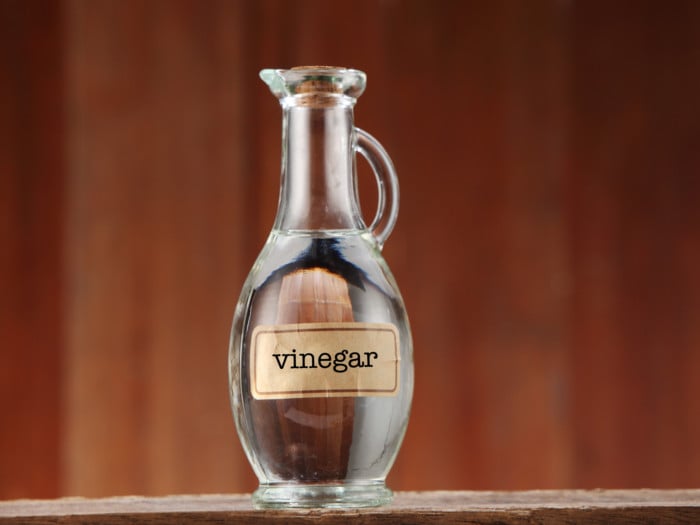There are various reasons why you might need white wine vinegar substitutes, and many will be undetectable in your recipes!
White wine vinegar is made by adding bacteria to different varieties of white wine. It has a sweet, tangy taste and is not as powerful as some other vinegar. White wine vinegar is particularly popular in French cuisine, for making certain sauces, like Hollandaise and Bearnaise, and is often used in meat dishes as a tenderizer. [1]
White Wine Vinegar Substitutes
Using white wine vinegar substitutes is a delicate process because vinegar is acetic acid, which causes many specific reactions in recipes and cannot be duplicated. If you are out of white wine vinegar, your best bet is to substitute with another kind of vinegar varieties such as champagne vinegar, rice vinegar, red wine vinegar, apple cider vinegar, and white vinegar.
Champagne Vinegar
Champagne vinegar is another mild, wine-based vinegar. It is a great substitute for white wine vinegar because it is similar in both taste and strength. However, the flavors of champagne vinegar are a bit more delicate and are easily overwhelmed by very strong savory flavors. This replacement is best for vinaigrettes, dressings, and sauces. [2]

White wine vinegar has a subtle flavor as compared to other kinds of vinegar. Photo Credit: Shutterstock
Rice Vinegar
Rice vinegar is another mild, light-colored vinegar. It is made from fermented rice and has a sweet, mellow flavor. It is used particularly in Asian cuisine. When substituting for white wine vinegar, stick to white rice vinegar. Brown rice vinegar is a bit heartier and sweeter whereas white rice has a fresh tang that mimics the white wine.
Red Wine Vinegar
Most kinds of wine vinegar end up with roughly the same acidity. So this is a good substitute, especially if the recipe calls for a lot of vinegar. Red wine vinegar will change the color of the dish, but it’s a great replacement for savory dishes like roasts and stews. Red wine vinegar also tends to taste stronger than white wine, so not as much may be required. [3]
Apple Cider Vinegar
Made from fermented apples, apple cider vinegar is one of the most common and least expensive vinegar on the market. It’s also remarkably versatile. With a light color and a slightly sweet flavor, it delivers the tang of vinegar with some signature apple sourness. It is not recommended for dressings or vinaigrettes where the flavor of the vinegar stands out. However, it is a great replacement for pickles, marinades, or other flavor-heavy dishes.
White Vinegar
White distilled vinegar is much more acidic than white wine vinegar. It is usually used in pickles and for cleaning. If you find yourself having to use white vinegar, dilute it with water and add a pinch of sugar to cut the acidity. [4]
Word of Caution: If you are following total avoidance of alcohol, you may want to skip using different kinds of wine vinegar as they do still contain some level of alcohol.
